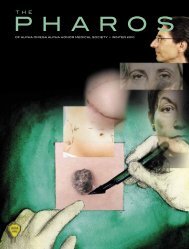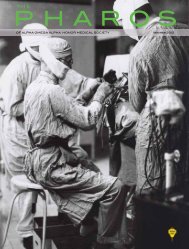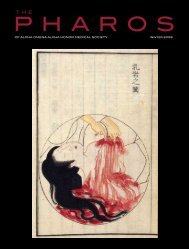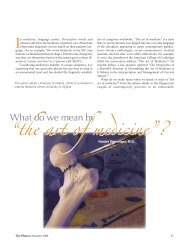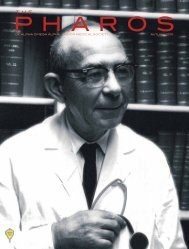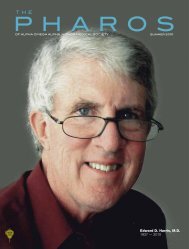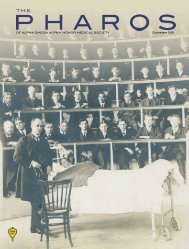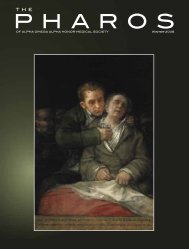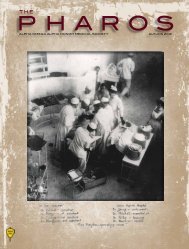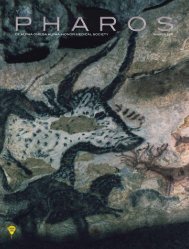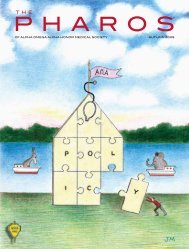4 - Alpha Omega Alpha
4 - Alpha Omega Alpha
4 - Alpha Omega Alpha
Create successful ePaper yourself
Turn your PDF publications into a flip-book with our unique Google optimized e-Paper software.
Dr. Lois relates one sobering incident<br />
in the realm of medical ethics.<br />
Toward the end of her life, when cancer<br />
had obstructed her ureters, Deb<br />
decides against having nephrostomy<br />
tubes inserted to prevent renal failure.<br />
“I’m not going to be medicalized,” she<br />
explains. p168 Deb’s choice comes as a<br />
surprise to Dr. Lois, who by that time<br />
had already been practicing medicine at<br />
least six years: “That conversation was<br />
a real eye-opener for me. With most<br />
patients, I had never thought of this as<br />
a choice.” p168 Not a choice? Hadn’t she<br />
ever discussed forgoing life-extending<br />
therapy with one of her cancer patients?<br />
I would hope that Dr. Lois had<br />
done so before Deb’s case, which occurred<br />
after she had completed several<br />
years of gynecologic oncology practice.<br />
Fortunately, Deb is then offered a stent<br />
rather than an external tube, an option<br />
she accepts, thus making her earlier<br />
decision moot.<br />
Although I found The Light Within<br />
interesting and competently written, I<br />
was disappointed because through most<br />
of the book the spiritual dimension—so<br />
often referred to by its protagonists—<br />
doesn’t come alive. Early in the text<br />
Deb introduces Dr. Lois to Buddhism<br />
and Ram Dass’s teaching, “Be here<br />
now.” Much later, Nuri, her fiancé, is<br />
helping her learn the same lesson: “to<br />
enjoy the present—to be in the now,<br />
as Deb had put it.” p156 In the chapter<br />
entitled “Spirituality and Cancer,” Deb’s<br />
ovarian cancer recurs and the question<br />
“How long do you think I have?” arises.<br />
Dr. Lois observes, with regard to their<br />
friendship, “I began to notice that some<br />
of my fellow oncologists were also being<br />
drawn—sometimes against their<br />
will—into similarly deep and spiritual<br />
relationships.” p167 Yet the narrative contains<br />
few reflections on human dignity,<br />
suffering, or the meaning of illness, and<br />
no attempt to evoke in words the spiritual<br />
experiences the authors refer to.<br />
Thus, I was taken by surprise when<br />
on page 197 I came to the episode where<br />
Deb reads a passage from the biblical<br />
book of Isaiah to Dr. Lois: “The voice<br />
said, Cry. And he said, What shall I cry?<br />
All flesh is grass, and all the goodliness<br />
thereof is as the flower of the field.” My<br />
reaction to this passage was immediate<br />
and visceral. I burst into tears. Not just a<br />
single sob or two, not just a crinkling of<br />
my eyes. No, I literally burst into tears,<br />
feeling a sense of loss and a deep yearning<br />
seemingly unattached to any specific<br />
object. As I read on, a quieter version of<br />
the same reaction occurred at page 218<br />
where Abby, Deb’s adolescent daughter,<br />
thanks her dying mother for being her<br />
mother and for fighting so hard to stay<br />
alive. I’m not sure how to interpret these<br />
reactions, and it is probably unprofessional<br />
for a reviewer to cite tears as data<br />
in a book review. Nonetheless, I acknowledge<br />
them because the spirituality<br />
I was looking for all along seemed to<br />
“click” for me in the last chapter of The<br />
Light Within. The authors’ stories may<br />
appear for most of the book to promise<br />
more than they deliver, but in the end<br />
they come together powerfully and, at<br />
least for me, they triggered a revelatory<br />
experience.<br />
Life in the Balance and<br />
The Light Within are<br />
two very different, but<br />
complementary, memoirs.<br />
Neither is stale or<br />
routine. Each is fresh<br />
and surprising in<br />
its own way. Both<br />
are tales that deserve<br />
our attention.<br />
Dr. Coulehan is a published<br />
poet and author.<br />
He is the book review<br />
editor for The Pharos<br />
and a member of its editorial<br />
board. His address is:<br />
Department of Preventive<br />
Medicine, HSC L3-086<br />
State University of New York at Stony<br />
Brook<br />
Stony Brook, New York 11794-8036<br />
E-mail: jcoulehan@notes.cc.sunysb.edu<br />
Office Hours<br />
A search for disease<br />
Amidst innocent chatter.<br />
Anxious eyes.<br />
Hidden fears.<br />
Disease selects a stranger,<br />
And merges our lives.<br />
Adding me to the broth,<br />
That sustains a life.<br />
Each subsequent visit;<br />
A sip of sustenance,<br />
Cratered in a bowl<br />
Of hope.<br />
Cupped by trembling hands,<br />
The bowl touches lips.<br />
Eyes speak,<br />
“OK to drink?”<br />
Eyes that occupy<br />
My pensive moments.<br />
My morning drive.<br />
My sleepless nights.<br />
Steven F. Isenberg, MD<br />
Dr. Isenberg (AΩA, Indiana University, 1975)<br />
is assistant professor of Otolaryngology—Head<br />
and Neck Surgery at Indiana University School<br />
of Medicine. His address is: 1400 North Ritter<br />
Avenue, Suite 221, Indianapolis, Indiana 46219.<br />
E-mail: sisenberg@good4docs.com.<br />
The Pharos/Spring 2009 45



